
There’s nothing quite so satisfying (or for some, necessary) as starting your day with a freshly brewed cup of coffee. These days, your choices to make that perfect cup of joe are legion, but not all coffee is created equal.
Naturally, we here at Grow Ensemble want to ensure that the beans we consume are grown and roasted in ethical, sustainable, and environmentally-friendly ways. So, we created this list of our favorite fifteen brands that are making delicious coffee for conscious consumers.
Here’s how this post works:
- We’ll provide you a ‘quick-hit’ list of sustainable coffee brands.
- We share with you some of the issues, ails, and need-to-knows of the coffee industry.
- On some of our most “favorite” brands, we’ll do a little more extensive write-up to share why they make our favorites list.
Let’s get to it!
This article includes some of what we think are among the most ethical and sustainable coffee purveyors, but this is by no means an exhaustive list.
In addition to the companies we’ve listed, we realize that coffee drinkers may want to support a local roaster. No matter where you’re getting your java fix, there are aspects of the coffee industry, from production to roasting, that affect each cup, and that are worth noting as a conscious coffee drinker.
Before we get into our more in-depth write-ups, here’s a quick look at our #BuyEnsemble picks for the best fair trade and sustainable coffee brands.
Sustainable and Fair Trade Coffee Brands We Love
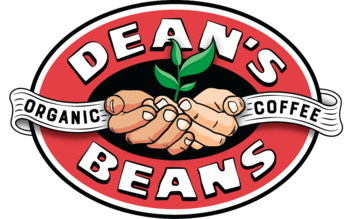
Dean’s Beans
Location: Orange, MA
Organic: ✅
Fair Trade: ✅
Bird Friendly:✅
Kosher: ✅
Additional Certifications: B Corporation
Visit Dean’s Beans
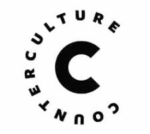
Counter Culture Coffee
Location: Durham, NC
Organic:✅
Fair Trade: ✅
Bird Friendly:✅
Kosher: ✅
Additional Certifications: None that we found
Visit Counter Culture
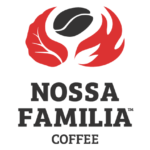
Nossa Familia Coffee
Location: Portland, OR
Organic: ✅
Fair Trade: ✅
Bird Friendly:🚫
Kosher: 🚫
Additional Certifications: B Corporation
Visit Nossa Coffee
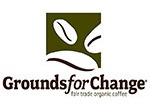
Grounds for Change
Location: Poulsbo, WA
Organic: ✅
Fair Trade: ✅
Bird Friendly: ✅
Kosher: 🚫
Additional Certifications: B Corporation, 1% for the Planet, Carbon-Free
Visit Grounds for Change

Birds & Beans
Location: Byfield, MA
Organic: ✅
Fair Trade: ✅
Bird Friendly:✅
Kosher: 🚫
Additional Certifications: None that we found
Visit Birds & Beans
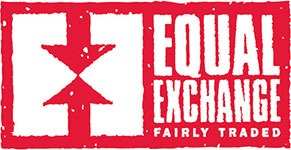
Equal Exchange
Location: West Bridgewater, MA
Organic: ✅
Fair Trade: ✅
Bird Friendly:🚫
Kosher: 🚫
Additional Certifications: None that we found
Visit Equal Exchange
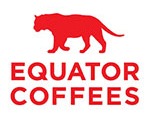
Equator Coffees
Location: San Rafael, CA
Organic: ✅
Fair Trade: ✅
Bird Friendly:🚫
Kosher: 🚫
Additional Certifications: B Corporation
Visit Equator Coffees
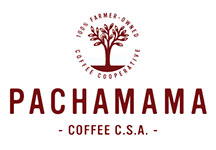
Pachamama Coffee Cooperative
Location: Sacramento, CA
Organic: ✅
Fair Trade: ✅
Bird Friendly:✅
Kosher: 🚫
Additional Certifications: None that we found
Visit Pachamama
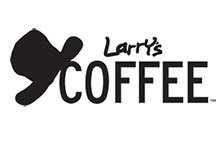
Larry’s Coffee
Location: Raleigh, NC
Organic: ✅
Fair Trade: ✅
Bird Friendly: ✅
Kosher: ✅
Additional Certifications: B Corporation
Visit Larry’s Coffee
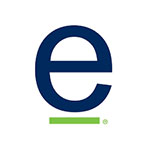
Ethical Bean Coffee
Location: Vancouver, BC
Organic: ✅
Fair Trade: ✅
Bird Friendly: 🚫
Kosher: 🚫
Additional Certifications: None that we found
Visit Ethical Bean
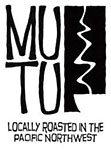
Mutu Coffee
Location: Spokane, WA
Organic: ✅
Fair Trade: ✅
Bird Friendly: 🚫
Kosher: 🚫
Additional Certifications: B Corporation
Visit Mutu Coffee
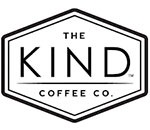
Kind Coffee
Location: Estes Park, CO
Organic: ✅
Fair Trade: ✅
Bird Friendly: 🚫
Kosher: 🚫
Additional Certifications: B Corporation, 1% for the Planet
Visit Kind Coffee
The Need to Knows of Ethically Sourced & Sustainable Coffee
Sustainability and ethical concerns are often similar across industries, but there are some particularly pressing issues when it comes to coffee, including farmer/producer compensation, labor conditions, sustainable growing practices, and environmental stewardship.
Certifications that seek to address these concerns in the java space are plenty. But, like all things, in order to understand the value of a certification, it’s important to be familiar with the issues they address and the scope of impact they monitor.
With so many certifications and labels stamped on products we use every day, it’s always important to understand the efforts of the company behind the certification, and not just rely on the logo. While some certifications are established and known for their stringent and transparent methods of enforcing corporate accountability (think B Corporations), others may be more nebulous in their definitions and requirements.
With a deeper look into the environmental and social issues within the coffee universe, the certifications that attempt to protect against them, and the debates surrounding those efforts, conscious coffee consumers will be able to support better-for-the-world java suppliers and enjoy guilt-free coffee consumption.
Fair Trade
What is it?
Fair trade as a concept is generally concerned with economic empowerment and social justice for farmers, workers, business owners, and their communities. A myriad of fair trade organizations and certifications exist for a variety of industries, but there are two main certification entities involved specifically with coffee production.
Both certifications are ostensibly concerned with giving small-scale coffee producers greater market access and economic power by incentivizing them to meet specific labor, environmental, and production standards in exchange for a guaranteed premium over the base commodity market price for their beans (the benefits of the fair trade stamp).
Each organization has an enforcement arm that audits certification applicants and recipients to ensure compliance. While similar in many respects, these two certifications have their own standards, are open to different sorts of coffee producers, have different badges, and are administered by separate nonprofit organizations.
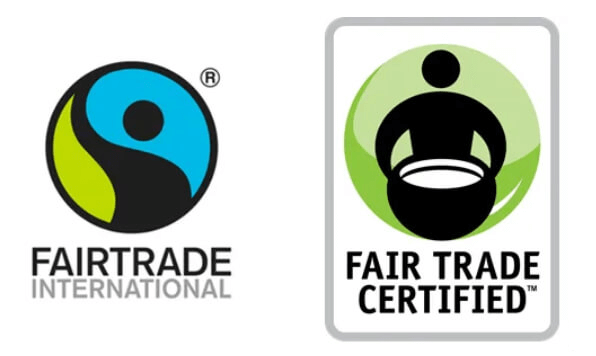
Fairtrade certification (the black logo) is administered globally by Fairtrade International and by Fairtrade America in the U.S. Its certification is exclusively available to cooperatives of small coffee producers.
Fair Trade certification (the white logo) is administered by Fair Trade USA and is available, not only to co-ops, but also to single farms of any size and groups of non-landholding laborers.
Things to be Aware Of
While the stated goals of Fairtrade International and Fair Trade USA are undoubtedly noble, these organizations are not without controversy, and there is still work to be done on the issues they address. Multiple academic papers call into question whether their models guaranteeing a minimum price actually bring their promised economic benefit to farmers, especially the poorest farmers.
That research shows the fair trade system to be an economical boon to some farm owners, but has not increased the amount of money flowing to laborers. Additionally, there is evidence suggesting that the costs of obtaining certification exceed the additional income fair trade coffee brings producers, making certification cost prohibitive for some farmers.
Additionally, Fair Trade USA was once part of Fairtrade International but became an independent organization so it could certify producers not using a co-op model. This opened the door for large-scale coffee plantations to obtain certification, which many in the coffee industry consider to be counter to the original mission of fair trade.
The separation was controversial for some in the fair trade world, but still, Fair Trade USA’s requirements for certification are not so different from Fairtrade International. While neither system is perfect, fair trade certified coffees are produced with both economic and environmental sustainability in mind.
There are also other fair trade organizations that are complementary to the big two organizations, sharing a similar focus on helping producers and their communities and incentivising sustainable agricultural practices. Fair for Life uses a third-party certification scheme and has certified a handful of coffee brands.
A small number of coffee companies in the U.S. are also members of the Fair Trade Federation. The Federation doesn’t dole out certifications—instead, it carefully screens and selects its members, who are required to self-report and verify that they operate their businesses according to the organization’s nine fair trade principles.
Direct Trade and Single Origin
What is it?
“Direct trade” is a term that is tangentially related to fair trade, but it is a distinctly separate concept you’ll find practiced by some coffee brands. Generally, direct trade is used to describe beans sourced by coffee roasters straight from producers, as opposed to purchasing beans through brokers or importers.
This means roasters build relationships with coffee producers to forge contracts with them directly. This gives more economic stability to coffee farmers giving them a spot at the negotiation table and an opportunity for higher prices for their premium beans.
It in turn incentivizes the production of higher quality beans and often more sustainable production and delivery methods—the benefits of the direct relationship encourage quality as opposed to merely quantity, which is sometimes necessary when farmers are forced to compete for a middleman’s business within a large catalog of producers.
It also allows roasters and distributors to ensure their fair trade practices are carried out through to the farmers, avoiding the uncertainty that can come with using a middleman.
“Single-origin” coffee often goes hand-in-hand with direct trade because it refers to beans sourced from a specific geographic region, as opposed to a blend of beans from various regions. It is a term associated with higher-priced, high quality, and specialty coffee.
Things to be aware of
One large gap in this arena is that there are no set standards or certifications for what exactly constitutes “direct trade” or “single-origin.” So the direct trade label could mean the coffee brand owns its supply chain or works closely with farm representatives to support producers and their communities to produce better coffee, or it could be geared more toward marketing, representing a much more distant relationship than would be expected. Likewise, a single-origin coffee could refer to a country, a co-op, a farm, or a specific lot on a farm.
Diligence and continued reform in the space will hopefully further the development of these concepts into more well-defined practices and ultimately into established certifications.
Organic
What is it?
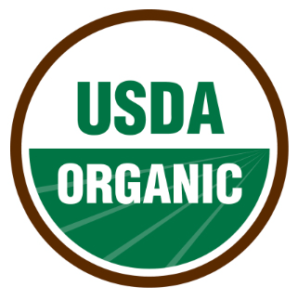
Along with fair trade, certified organic coffee is one of the most common labels pertaining to sustainability you’ll find on coffee. The United States Department of Agriculture sets the standards for organic products, and it created the National Organic Program to run the certification process.
The list of standards is long, but generally, they’re concerned with soil and water quality, pest and weed control, and land management.
To obtain certification, producers, and processors must develop organic system plans incorporating all of the requirements. For growers, they must show that their land has not been treated with any prohibited (synthetic) fertilizers or pesticides for three years prior to harvest and document their crop rotation plans for preventing soil erosion.
To maintain certification, all organic coffee must be kept separate from any non-organic beans at each step of the production process.
Things to be Aware of
The cost of obtaining and maintaining organic certification can be a significant burden, and it can sometimes be greater than the financial return producers gain through certification, especially for small-scale farms (this is a recurring concern with certifications).
Given that certification can be cost prohibitive for some farms, it’s important to note that many farmers grow their beans using organic and sustainable methods, but have not, for financial or other reasons, obtained USDA certification. Researching into the company behind your coffee can help you determine what their practices truly look like.
Additionally, it’s important to become familiar with what it means to be grown “without pesticides”. Some pesticides are given a pass so long as they are on the National Organic Program approved substances list.
Rainforest Alliance
What is it?
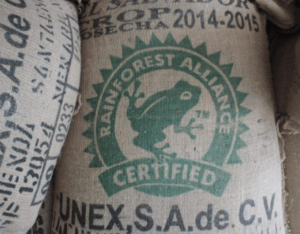
The Rainforest Alliance is an international nonprofit organization dedicated to the preservation of forests and the promotion of responsible and sustainable business and agricultural practices.
For a coffee farm to be certified by the Alliance, it must meet standards pertaining to four main principles: biodiversity conservation, natural resource conservation, effective planning and farm management, and improved livelihoods and human well-being. Like Fairtrade International and Fair Trade USA, the Alliance has an internal arm that audits certification applicants and recipients to ensure compliance with their standards.
Additionally, the Rainforest Alliance is in the process of revising its standards after a 2018 merger with UTZ (another international certification program focused on sustainable farming).
Things to be Aware of
Rainforest Alliance certification has not been without its problems. Various reports over the last decade have revealed shortcomings, particularly with regard to its auditing process and failure to ensure ethical labor standards on certified farms.
Concerns over the health, safety, and economic protections provided to workers in Rainforest Alliance Certified businesses created controversy around the certification reliability.
Bird-Friendly/Shade Grown Coffee
What is it?
Shade-grown, like direct trade and single origin, is a term without any standardized meaning and there is no certification required to use the term. It generally relates to biodiversity and environmental conservation.
Ideally, however, shade-grown is used to mean the coffee was grown beneath the canopy of existing forest, thereby preserving the habitat and all its naturally occurring forms of life. Because there’s no certification or organization policing its use, “shade-grown” doesn’t necessarily mean that coffee is environmentally friendly.
It could be used by growers who clear-cut naturally occurring diverse forest and replace it with non-native trees, destroying the ecological balance of the area. Again, research into the specific company providing your coffee will provide more insight on this front!
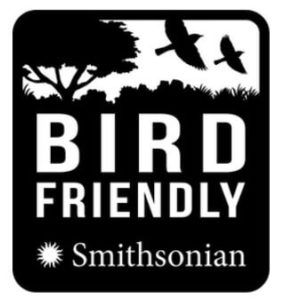
Bird-Friendly certification, however, is essentially the official and best version of “shade-grown.” Created by the Smithsonian Institution and informed by its research, the Bird Friendly criteria cover everything from canopy height to insect biodiversity to protect the wildlife that lives where coffee is grown. The certification requires coffee producers be USDA Organic certified as well.
As with other certifications, the cost of obtaining Bird Friendly certification is substantial for producers. However, it is widely regarded as the gold standard for environmentally-sustainable coffee certifications, and if your coffee beans sport the Bird-Friendly badge, you can rest assured they’re often as eco-friendly as it gets.
Other General Certifications
Some companies, indeed some of our faves, aren’t sporting many of these certifications we mentioned, but what they opt for instead offers many of the same assurances. For example, B Corp Certification requires certain labor protections and environmental stewardship that has overlap with the certifications above.
So, have we mentioned you should learn more about the specific company putting that coffee in your hands? Most companies that are engaged in better business practices will have that information readily available for you to spot check and review, so keep your eyes peeled!
Fair Trade, Organic, & Sustainable Coffee Brands: Our 5 #BuyEnsemble Favorites
1. Dean’s Beans
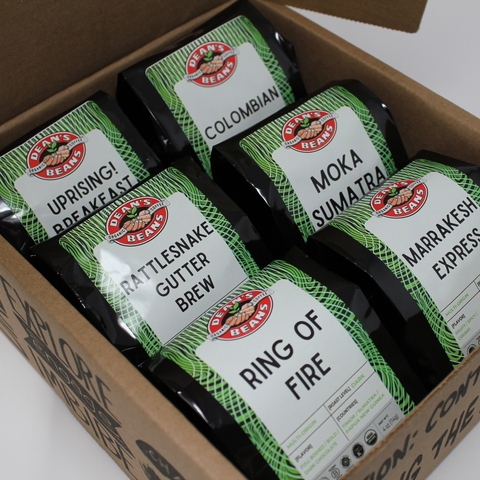
Dean’s Beans is the epitome of a socially-responsible company.
As a roaster and retailer for over twenty years, the company, a Certified B Corp, was founded “to use high-quality specialty coffee as a vehicle for progressive change throughout the coffee lands of Asia, Africa, and the Americas.”
A member of the Fair Trade Federation, the company is a co-founder of Cooperative Coffees, an organization of roasters that pioneered true direct trade, buying beans directly from coffee farmers.
The team at Dean’s Beans go above and beyond as leaders in the space of sustainable and ethical business.
They have relationships with all of the growers they work with, and they support them in developing and utilizing sustainable agriculture to fight climate change. They also promote community organizing and education, gender equality, youth leadership development, provide legal assistance, and fund health clinics and training.
Dean’s Beans devotes considerable time and resources to ensuring its coffees are produced in an environmentally conscious way, including helping farms obtain organic certification, Bird Friendly certification, and in Peru, they created the world’s first carbon-neutral coffee!
The company also launched a line of compostable packaging that’s 60% biodegradable. Okay, one last thing: the company’s headquarters generates 78% of its electrical needs through a solar system. We had the pleasure of interviewing THE Dean of Dean’s Beans, Founder Dean Cycon on our podcast, and had a great conversation about coffee globalization and the company’s continued efforts to better the coffee industry. Give that a listen to learn more.
Dean’s Beans offers 1lb and 5lb bags of whole bean or ground coffee from Columbia, Ethiopia, Guatemala, Mexico, Nicaragua, Timor-L’este, Papua New Guinea, Peru and Sumatra. The company offers its own blends, but they also offer a service that allows you to create your own custom blend!
They have 3 grinds—coarse, normal, or espresso—and medium roasts, medium-dark and dark roasts available. Plus, you can get green (unroasted) beans if you’re a home roaster, natural water processed decaf, or a specific cold brew blend.
And, if you’re having trouble deciding which coffee you want, there are regular, decaf, and green sampler packs that come with six 4oz bags of Dean’s Beans’ most popular coffees!
Shop Dean’s Beans’ conscious collection of coffees at DeansBeans.com
![]() PROS
PROS
- Truly devoted to social and environmental justice in both word and deed.
- Options to satisfy every type of coffee drinker, including a custom blend option!
- One of the least expensive options for ethical coffee.
![]() CONS
CONS
- Limited options for fans of flavored coffee.
2. Grounds for Change
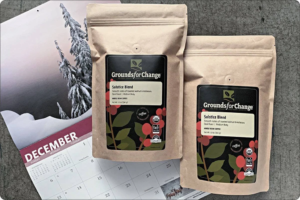
Grounds for Change is located on the Kitsap Peninsula, just across the water from the mecca of U.S. coffee, Seattle, Washington. It’s a family-owned and operated Certified B Corporation that is unique in the ethical coffee world in that it is a Certified Carbon-Free business, meaning its entire supply chain from crop to cup is offset by trees the company plants.
And Grounds for Change’s environmental bonafides don’t stop there. It uses 100% renewable energy, has an extensive recycling program to reduce waste, and donates over 1% of its gross annual sales to environmental and social organizations as a fellow member of 1% for the Planet.
Their coffees are also all certified organic by the USDA, and the company has created custom blends with the Rainforest Trust, Seattle Audubon Society, Save our Wild Salmon and Earth Ministry, with a portion of the proceeds of each bag donated to those respective organizations.
On the social side, all Grounds for Change coffees are certified fair trade by Fair for Life and the company works with the Cafe Femenino Coffee Project in Peru that’s dedicated to empowering and supporting historically marginalized women in the coffee industry.
In addition to being a certified B Corp, Grounds for Change is an official Social Purpose Corporation under the laws of the State of Washington.
Grounds for Change offers coffees in 8oz, 12oz, and 16oz, as well as 2lb and 5lb bags in a variety of roasts, from light to dark. You can grab individual bags, samplers, or gift sets for a true gift that gives back. Their small batches of blends are composed primarily of beans from Latin America but also from African and Asian sources as well. The company also offers single-origin coffees from Guatemala, Nicaragua, Honduras, Congo, Columbia, Ethiopia, Sumatra and Peru.
Learn more and shop their socially responsible roasts at GroundsforChange.com
![]() PROS
PROS
- All Fair Trade, Organic, and Carbon-Free certified coffees.
- Multifaceted support of social and environmental causes.
- Certified B Corporation and an official Social Purpose Corporation!
![]() CONS
CONS
- High-end on price.
3. Counter Culture Coffee
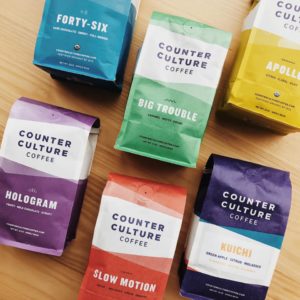
Counter Culture Coffee is among the most transparent coffee companies in existence.
Every year for the past decade it has released a transparency report that details its efforts to become a more sustainable company. They also showcase how Counter Culture’s direct trade specialty coffee model works.
Largely, that transparency is geared towards price transparency, which lets you understand the price you pay, and ensures that coffee farmers are getting paid fairly.
Their environmental efforts include becoming a USDA certified organic roaster, partnering with Duke University on climate change adaptation research, and they conduct climate change adaptation workshops for coffee farmers.
They are also active in environmental innovation and development with their Sustaining Environmental and Educational Development at Source (SEEDS) program that gives grants to producers to fund environmental and social projects those producers deem beneficial to their communities.
Counter Culture has a range of blends and single-origin coffees from most every coffee-producing region of the world. They have light, medium, and dark roasts available in 12oz, 24oz, and 5lb bags.
Enjoy a cup of transparent and responsible joe at CounterCultureCoffee.com
![]() PROS
PROS
- Extremely transparent about sourcing of beans and payment of producers.
- Pioneer of direct trade centered on full ownership of supply chain and supporting producer communities.
- Walks the walk to create a sustainable coffee industry.
![]() CONS
CONS
- High end on price.
- Not all coffees are organic.
Equal Exchange
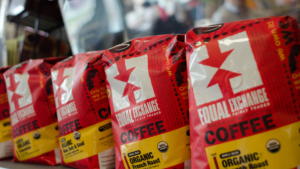
If you are concerned with labor rights, Equal Exchange is the coffee roaster for you. As a global worker-owned and operated cooperative, Equal Exchange is dedicated to helping increase the economic power of farmers and their families.
Because Equal Exchange is focused on helping the agricultural communities they work with, their environmental bonafides reside in their fair trade standards and practices to promote sustainable and safe farming methods. Additionally, it sources 98% USDA certified organic beans.
Equal Exchange coffees come in medium to dark roasts and are sourced from Nicaragua, Peru, Ethiopia, Congo, Colombia, Guatemala, Mexico, and Honduras. You can order 10oz or 12oz bags in packs of six or 5lb bags of ground or whole bean coffee.
Additionally, Equal Exchange touts wholesale pricing for all of their products. Their 1lb bags of percolator specific blends come in five-packs for those in it for the long haul.
They also offer a dozen single-serve pods (like k-cups) in six-packs. Don’t worry—their single-serve coffee cups are an environmentally-friendlier alternative to the k-cup, made of recyclable plastic and aluminum with a compostable filter, and the coffee inside is sourced directly from small-scale farmers!
Browse Equal Exchange’s selection of beans and single-serve pods at EqualExchange.coop.
You can also shop Equal Exchange’s coffee and other products with your Thrive Market subscription!
![]() PROS
PROS
- Dedicated to authentic fair trade to benefit small farmers.
- All worker-owned cooperative
- All organic coffee, including single-serve cups.
- Good price per pound.
![]() CONS
CONS
- Not as focused on environmental conservation as other roasters.
- No online option to buy small amounts of beans.
5. Larry’s Coffee
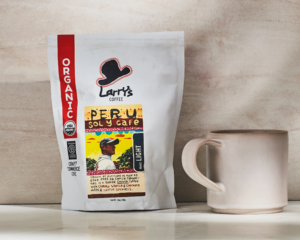
Larry’s Coffee is a sustainability-focused roaster located in Raleigh, NC. They are a Certified B Corporation that sources all USDA certified fair trade organic coffee, plus it’s all shade-grown.
They are focused on building long-term relationships with farmers and source their beans through Cooperative Coffees, a co-op of independent roasters that imports fair-trade beans directly from producers (co-founded by our friends at Dean’s Beans as you already know!).
Larry’s also makes annual visits to its partner farms and uses a third-party auditing service to ensure its fair trade labeling claims are accurate as claimed.
Larry’s roastery utilizes passive solar day lighting and solar energy powered radiant floor heating to minimize their internal power usage. Additionally, the building has a 10,000 gallon rainwater harvesting system that powers the toilets at the facility, and has a plant-based biodiesel pump on the property for use by the community.
Like the others on this list, Larry’s offers blended and single origin coffees from around the world in light, medium, and dark roasts.
You can buy whole bean or ground coffee in six different grinds, depending on your brew method, and the company also offers packages of a dozen fully recyclable k-cups.
Brew a cup of Larry’s people-and-planet friendly coffee at larryscoffee.com
![]() PROS
PROS
- Certified B Corporation!
- Source coffees through Cooperative Coffees.
- Committed to transparent fair trade.
- Insanely environmentally friendly HQ.
![]() CONS
CONS
- High end on price.
Enjoy Your Conscious Cup of Coffee ☕️
It is, in fact, possible to enjoy your morning coffee guilt-free, now that you’re armed with the information and a few resources that will help you keep up your mornings conscious consumer-friendly.
All these companies are bringing the coffee industry into the sustainable capitalism movement. Now that you’ve read this post, you’re familiar with various certifications and badges you’ll find on many sustainable beans, and you’re ready to launch into action.
The best way to find the coffee that makes you feel good with each sip? Learn more about the roaster and producer the coffee is coming from. Not only will you be able to tell who is the real deal in sustainable and ethical java, but some of these companies will inspire you with the ground-breaking work they do!
And there are SO many cups of coffee to choose from. In the process of researching this article, we found roasters in every part of the U.S. doing their best to bring you ethical and sustainable coffee.
So if you want to go local instead of going with one of our suggestions, you know what you’re looking for!
It’s just a matter of figuring out what’s important to you when it comes time to voting with your dollars: supporting local business, improving labor rights and economic opportunity for producers, environmental conservation, or (hopefully) all three!

Michael Gorman
Grow Ensemble Contributor
In past lives, Michael was the Editor-in-Chief of Engadget and an employment attorney in California. He currently lives in San Antonio, Texas, and when he’s not writing or thinking about economic or environmental justice, he’s probably somewhere referring to himself in the third person and playing with his dogs. You can keep up with Michael via Instagram or his website.
Our Latest Articles & Interviews:
The Better World Weekly Newsletter
Join 7,000+ others exploring the who, what, why, and how of building a better world and sign up here.

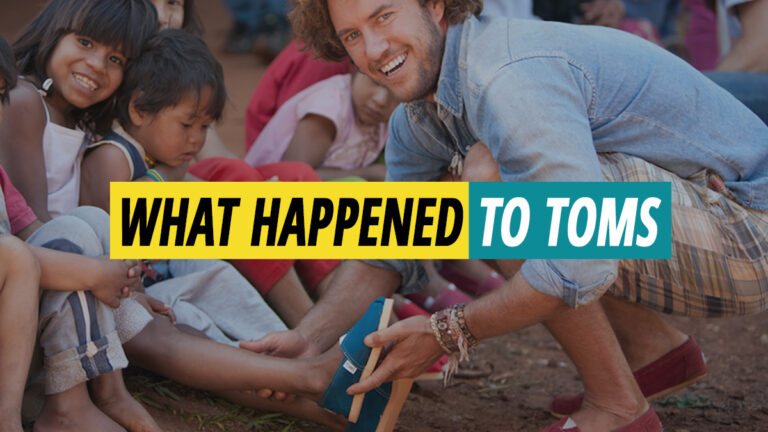

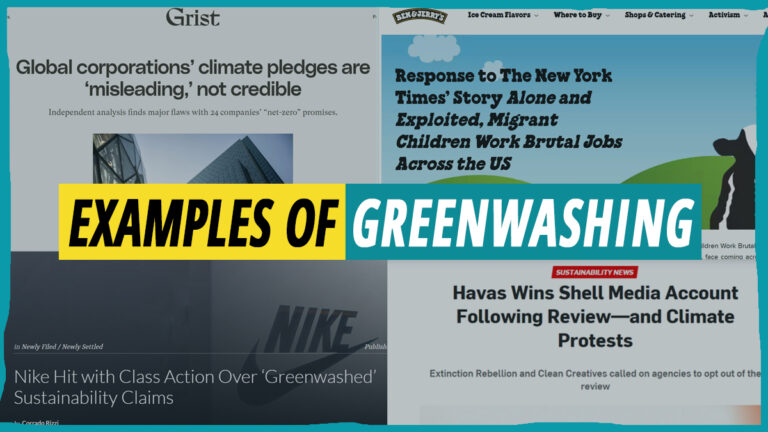
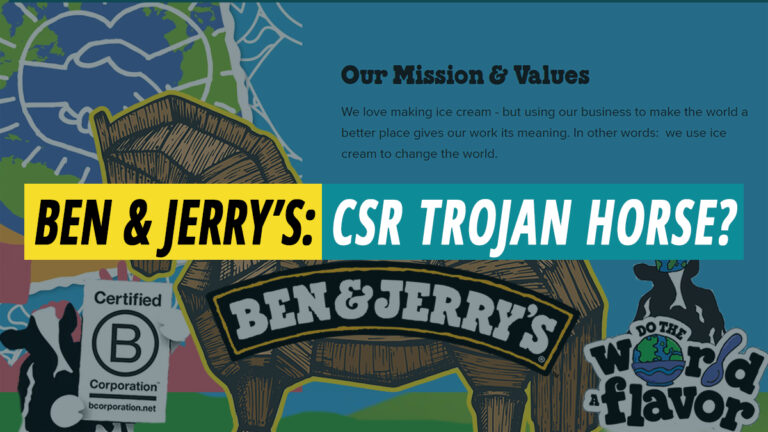
Leave a Reply